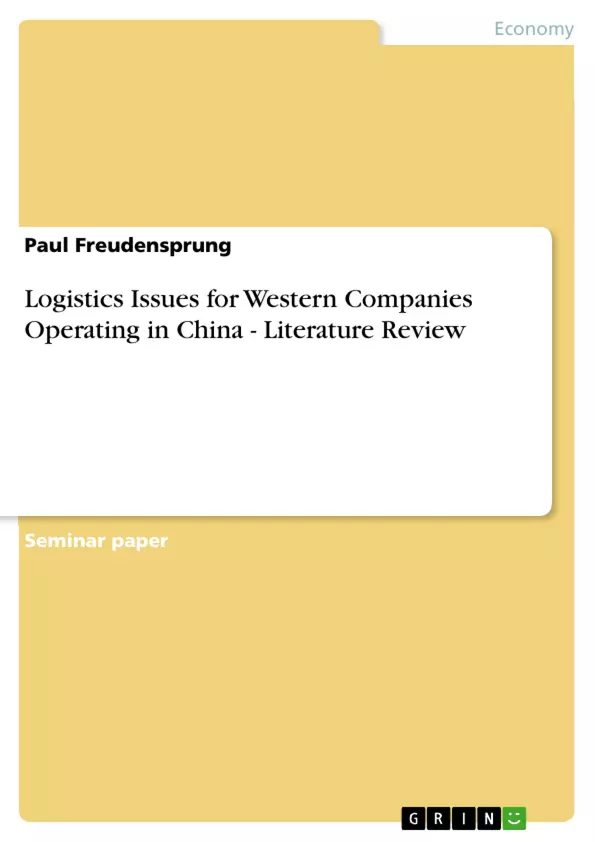Despite the heavy commitment of the central government impediments exist for foreign companies to successfully exploit business opportunities in China. Two major studies(Kawahara et al 1995, Carter et al 1997) suggest the most important barriers to business
operations concern the supply chain and distribution, particularly transportation. The various logistics functions form major obstacles (Peng 1995, 680). Although this paper focuses on supply chain issues also value chain issues will be touched, as many of the outbound business functions are perceived as shared responsibility of marketing and logistics(Murphy et al 1992, 14).
Inhaltsverzeichnis (Table of Contents)
- Introduction
- Barriers in logistics and their implications for foreign companies
- Transport Infrastructure
- Transport Services
- Purchasing
- Order Processing/ Documentation
- Unitisation
- Warehousing and Inventories
- Distribution
- Underlying key-issues of the logistics dysfunctionalities
- Cultural differences
- Political and administrative influences
- Management practice
- Capital constraint
- Strategic solutions applied by foreign companies
- Using local distribution and shipping service providers
- Establishing joint-ventures
- International providers
- Creating their own system
- Conclusions
Zielsetzung und Themenschwerpunkte (Objectives and Key Themes)
This paper examines the logistics challenges faced by Western companies operating in China. It analyzes the barriers to efficient supply chain and distribution, particularly transportation, and explores solutions adopted by foreign companies to overcome these difficulties. The paper focuses on key themes including:- The impact of inadequate transport infrastructure on foreign company operations in China
- The role of cultural differences, political and administrative influences, management practices, and capital constraints in shaping logistics challenges
- Strategies employed by Western companies to navigate these logistics obstacles, such as using local providers, establishing joint ventures, and creating their own systems
- The significance of purchasing and its impact on the overall supply chain efficiency
- The evolution of transportation services in China and their potential for future growth.
Zusammenfassung der Kapitel (Chapter Summaries)
Introduction
This section provides a general overview of the challenges Western companies face in China’s market, highlighting the importance of logistics and supply chain management in this context. The paper emphasizes that while China offers significant opportunities, inadequate logistics infrastructure and various other factors can pose significant challenges to foreign businesses.Barriers in logistics and their implications for foreign companies
This chapter delves into the specific logistical barriers encountered by Western companies operating in China. It analyzes various aspects of the logistics function, including transport infrastructure, transport services, purchasing, order processing, and warehousing. The chapter highlights the limitations of the existing infrastructure, the challenges of dealing with local suppliers, and the complexities of navigating the Chinese transportation system.Underlying key-issues of the logistics dysfunctionalities
This chapter delves into the root causes behind the logistics difficulties faced by foreign companies in China. It discusses the impact of cultural differences, political and administrative influences, management practices, and capital constraints on the effectiveness of logistics operations. This section provides insights into the complex interplay of factors contributing to these challenges.Strategic solutions applied by foreign companies
This section explores strategies implemented by Western companies to address the logistics challenges in China. It examines various approaches, including using local distribution and shipping service providers, establishing joint ventures with Chinese partners, relying on international providers, and creating their own logistics systems. These strategies demonstrate the proactive measures taken by foreign companies to overcome the logistical hurdles and establish successful operations in China.Schlüsselwörter (Keywords)
This paper focuses on logistics, supply chain management, transportation, infrastructure, cultural differences, political influences, management practices, capital constraints, strategic solutions, local providers, joint ventures, international providers, and purchasing in the context of Western companies operating in China.Frequently Asked Questions
What are the biggest logistics barriers for foreign companies in China?
The most significant barriers are inadequate transport infrastructure, complex transport services, and difficulties in distribution and purchasing.
How do cultural differences impact logistics in China?
Cultural differences influence management practices and relationships with local suppliers, often creating dysfunctionalities in the supply chain for Western companies.
What strategies do Western companies use to overcome these issues?
Common strategies include establishing joint ventures with local partners, using international logistics providers, or creating their own independent distribution systems.
Why is purchasing a critical factor in China's supply chain?
Inconsistent quality from local suppliers and complex order processing/documentation make purchasing a major obstacle for overall supply chain efficiency.
What role does the Chinese government play in logistics?
While the central government is heavily committed to infrastructure development, political and administrative influences still pose challenges to foreign business operations.
- Quote paper
- Paul Freudensprung (Author), 1998, Logistics Issues for Western Companies Operating in China - Literature Review, Munich, GRIN Verlag, https://www.grin.com/document/186329



